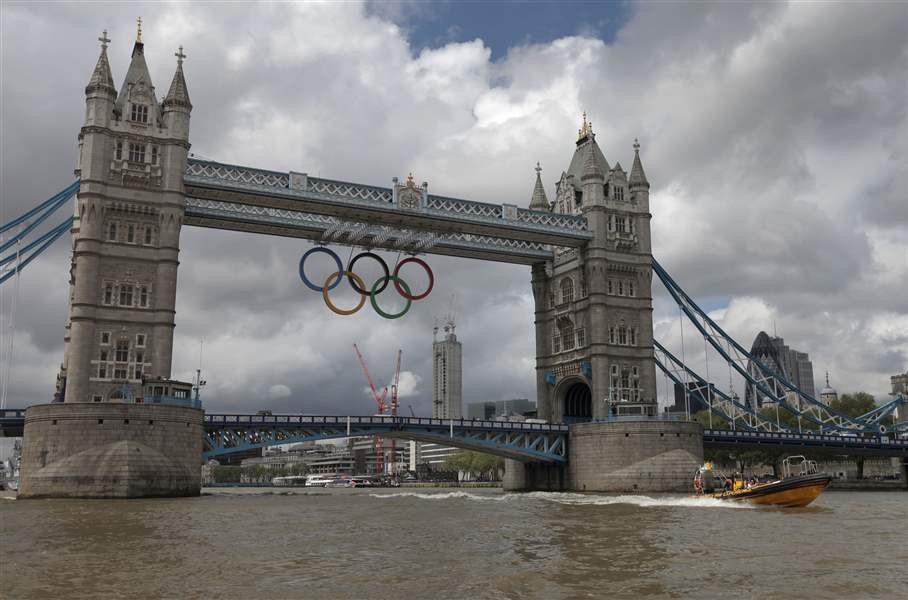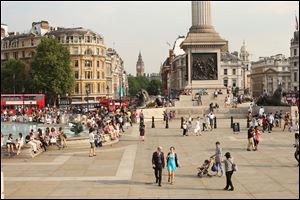
London offers global experience daily
7/27/2012
The iconic Tower Bridge spanning the river Thames shows its Olympic spirit in welcoming the world.
ASSOCIATED PRESS

The iconic Tower Bridge spanning the river Thames shows its Olympic spirit in welcoming the world.
LONDON -- Salman Farsi would like to invite the hundreds of thousands of visitors who will converge on London during the Olympic Games to a get-together of sorts.
Mr. Farsi, 26, is the media officer at the East London Mosque and London Muslim Centre. On Wednesday afternoon, two days before the Games were to begin with today's opening ceremony, he sat in his second-floor office, wearing khaki capri pants and sandals.
He seemed relaxed and excited about an important three weeks here at the city's largest mosque.
When it was announced in July, 2005, that London would be host for the 2012 Olympics, the leaders of the growing Muslim community here immediately viewed it as an opportunity. They looked at the lunar calendar and discovered that Ramadan, a month of fasting in which Muslims do not eat, drink, or have sex between dawn and sunset, would span the entire Olympics.
An unprecedented number of Muslims would be in town during the holy month, needing a place to pray. It also meant a rare occasion for outreach to non-Muslims from around the globe.
Mr. Farsi hopes all kinds will take advantage on Aug. 2, when an organization called London Citizens will host "100 Days of Peace: Citizens Iftar" at East London's York Hall, right down the street from the mosque. The idea is for Muslims to eat with non-Muslims after that day's fasting is over and promote peace as a lasting legacy for these Olympics.
"One of the priorities for us is to engage with visitors," Mr. Farsi said. "This is a chance to come together and, first and foremost, break a fast together."
To Mr. Farsi, London is a perfect place for the Olympics. It is the place that gave his grandparents an opportunity to emigrate from Bangladesh in the 1960s during the United Kingdom's first big wave of immigration. It is the place that has not persecuted him for his faith and offers an international experience every day he walks down the street or rides the London Underground, or "Tube," as it's called.
Welcoming the world

A general view of Trafalgar Square in London. During the Olympics, it often will be said that London is welcoming the world, but the reality is that the city has been doing just that for much of the last 60 years. Truly, Londoners believe, everybody should be able to feel at home here.
During the Olympics, it often will be said that London is welcoming the world, but the reality is that the city has been doing just that for much of the last 60 years. Truly, Londoners believe, everybody should be able to feel at home here.
"Best city in Europe, no doubt about it," said Saleem Suri, 30, who came to London from Pakistan seven years ago to study business. "I've traveled a lot, to Germany, Holland, Switzerland, and this city is different. It is not a Big Brother society. If you have a beard, they are not going to search you. The police know how to handle the different communities. That's the quality of Britain."
Culturally, Londoners see themselves as a fit for the Olympic ideal. It's the details, however, that have them worried as Friday night's opening ceremony approaches.
The city, already bulging with about 13,500 people per square mile, according to the 2011 United Kingdom census, will be under major strain. Citizens have been encouraged not to use the "Tube" train, and a driving lane has been designated all over the city for official Olympic use. You can find plenty of Londoners complaining about the traffic, but, in some ways, that's the beauty of it.
"We can show off a city that loves and hates the Olympics, that accepts and denies it," said Craig Taylor, the author of Londoners, which explains the city by telling the stories of its ever-diverse population. "When you hold it in Beijing, you don't have dissent. People can laugh at themselves here. They know it's not going to run smoothly. Things go wrong in London."
Old and new
It is an old city being forced to interact in increasingly new ways. Many tourists will visit with the goal of seeing the London that is often portrayed in popular culture, the London of Buckingham Palace, Beefeaters, Big Ben, and afternoon tea.
They will find those traditions easily, but if they choose to look deeper into the city's many arteries, they'll be introduced to places like Brick Lane, where 52 Bangladeshi curry houses line a narrow street and compete for business in the Whitechapel neighborhood.
"If they're showing up looking for a city completely populated by people who look like Hugh Grant, they might be a little disappointed," Mr. Taylor said.
London's diversity can be jarring if you're not expecting it. Katherine Curnow, 24, of Perth, Australia, moved to London a year ago hoping to get out and see the world, and she certainly accomplished that.
"Personally, I hated it for the first five to six months," Ms. Curnow said. "Apparently that's quite normal. It was different just because of all the different nationalities. But now I quite like it."
The new London has been even harder to adjust to for many natives. Lawrence Goldman grew up in London during the post-World War II period, when the city's first ethnic eateries began to spring up. It was a slower lifestyle that he relished -- and, it turned out, one of the last eras of old London.
"It was a sleeping giant," said Mr. Goldman, a professor of modern history at the University of Oxford. "It had lots of resources, lots of history, but it wasn't flaunting it. It wasn't like Manhattan; it wasn't even like Paris. It wasn't as stylish or as self-conscious as Paris. It was kind of modest, although there was an enormous kind of depth to it."
In short, it wasn't what it is today -- a frenetic city overcome by the ambition that drove it to spend an estimated $14.5 billion on the Olympics during a brutal economic recession.
"A lot of native-born people find it quite difficult because it's not the city they remember," Mr. Goldman said. "It's challenging, because culturally, it seems alien to them."
In 1951, three years after London last hosted the Olympics, 6.7 percent of London County's population of 3.3 million was born outside the United Kingdom, according to the census.
In the 2001 Census, nearly 25 percent of London's population of 7.2 million was foreign-born.
Immigration changes
The United Kingdom's immigration laws have changed often during the last half-century, but since the 1968 Race Relations Act, immigrants have been protected from discrimination. The act made it illegal to refuse housing, employment, or public services to people because of their ethnic background.
Even during a period when immigration was being discouraged -- the Commonwealth Immigrants Act of 1968 tightened the borders -- the foreign-born citizens of London had government protection.
"You have this interesting paradox, that attempts to restrict immigration [of] people of color went alongside legislation that was designed to outlaw racial discrimination," said David Feldman, a professor of history at the University of London's Birkbeck campus. "Policy makers were genuinely opposed to racial discrimination, but they genuinely thought people mixing would be a problem."
Attack fears
Mr. Feldman said that, today, Londoners' anxiety is no longer simply about race but of increased immigration from inside the European Union and the rise of a political Islam. The Olympics arrival has only stoked fears that terrorists will attempt an attack.
On July 7, 2005, a day after the city was selected to host these Games, four Islamist terrorists set off four bombs, three on the "Tube," and a fourth on a bus.
Fifty-two innocent people and the four suicide bombers -- all citizens of the United Kingdom -- were killed, and 700 more were injured. At the time, it was seen as no coincidence that the attack happened in the aftermath of the Olympics celebration.
Security for the Games came under scrutiny this month when private security contractor G4S, which was expected to provide 10,400 guards for the Olympics and Paralympics, fell far short in the number it was able to hire. Because of that, the government had to deploy 18,200 troops to take their place.
Forecasting long term, Mr. Feldman said that the legacy of these Games will be their effect on the East London community of Stratford, where Olympic Park stands in its unmistakable glory.
'Austerity Games'
The last time the Olympics were here, in 1948, they were dubbed the Austerity Games because no new buildings or infrastructure were erected in response to the conservative postwar economic climate. But Stratford, one of the most diverse and impoverished areas in the United Kingdom, has received such a dramatic face lift that it might as well be considered a London suburb.
Westfield Group, which owns the luxurious Westfield Shops that stand next to the Stratford "Tube" station, invested about $2.7 billion in the project, according to John Burton, Westfield's director of development.
[Westfield America, a subsidiary of the Sydney-based Westfield Group, owns Toledo's Westfield Franklin Park.]
Mr. Burton said the mall, which opened in September, has gone out of its way to hire more than 3,000 citizens of the Stratford area who had been unemployed.
"We had a social responsibility here to deliver jobs," Mr. Burton said.
The Block News Alliance consists of The Blade and the Pittsburgh Post-Gazette. J. Brady McCollough is a reporter for the Post-Gazette.
Contact J. Brady McCollough at: bmccollough@post-gazette.com, or on Twitter @BradyMcCollough.